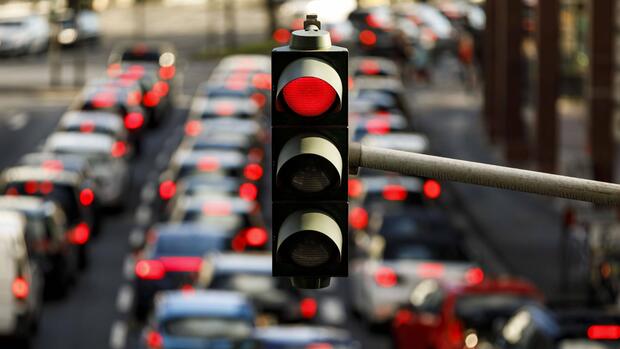AI solutions should avoid waiting times.
(Photo: imago images/Future Image)
Frankfurt The start-up Notraffic has raised 50 million dollars from investors. Among other things, the Israeli company wants to use the fresh money to finance its market entry in Germany, Italy and Japan, as founder Tal Kreisler told the Handelsblatt. According to financial sources, Notraffic’s valuation will rise to more than $100 million as a result of the deal.
Venture capitalists such as M&G Investments, VNV Global and UMC Capital participated in the so-called Series B financing round. Other investors include Grove, Vector Partners and Next Gear Ventures.
Notraffic offers a traffic management platform that uses artificial intelligence (AI) to reduce traffic congestion at intersections. For this purpose, sensors with cameras and radar are attached to existing traffic lights to monitor the flow of traffic. The Notraffic software enables the local authorities to use the data obtained to control traffic according to their own preferences via the traffic lights.
One possibility is to minimize waiting times for all road users, another to prioritize local public transport, emergency vehicles or pedestrians.
Intelligent traffic solutions that work with AI and process large amounts of data to optimize the flow of cars and other road users through cities are currently very popular. Some car manufacturers have corresponding offers, numerous technology companies are developing their own platforms.
The Israeli start-up has raised fresh money from investors.
(Photo: Notraffic)
When companies are sold, the purchase prices are often high. For example, the sale of the Siemens subsidiary Yunex to the Italian motorway operator Atlantia at the beginning of the year or the takeover of Econolite by the Karlsruhe traffic control software provider PTV.
With the help of Notraffic, around 26,000 tons of carbon dioxide could be saved per year in an average city with around 200,000 inhabitants, said Kreisler. “It’s as if there were 6,000 fewer cars on the road.” Traffic management in cities has hardly changed for decades and is based on rigid switching times, and does not react flexibly to the volume of traffic.
Notraffic: Major US cities are already among the customers
A lot of money is now available for the modernization of the US transport sector through the $1.2 trillion IRA infrastructure program. By the end of the year, 100 cities around the world wanted to use the emergency traffic technology to reduce traffic jams and make traffic safer, as Kreisler said. Previous customers mainly include major US cities such as Phoenix and Dallas.
Notraffic’s technology is also used by auto parts suppliers and technology companies such as Denso, Qualcomm, Nvidia and Rogers. Motorists could benefit from their vehicle receiving signals as to whether there is a danger at an intersection, said Kreisler. On the other hand, the car can prepare for a stop signal ahead of time and thus help to reduce fuel consumption.
From the point of view of the start-up’s lead investor, this is also important in order to make cities fit for the cars of the future. “Notraffic is taking critical steps to prepare roads for the era of connected and autonomous vehicles,” said Carl Vine of M&G Investments.
More: More traffic jams due to self-driving cars – this is how traffic researchers want to solve the problem
